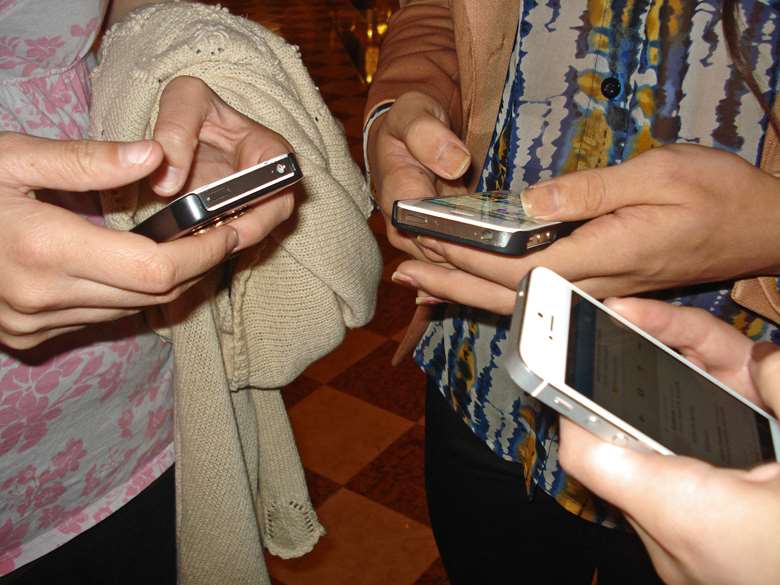Revenge porn laws: key questions
Laura McCardle
Tuesday, October 28, 2014
Young people who share explicit images of others risk being prosecuted under new legislation.

What is revenge porn?
The government describes revenge porn as the "distribution of a private sexual image of someone without their consent and with the intention of causing them distress".
At present, instances of revenge porn are dealt with under the Harassment Act or the Malicious Communications Act, but the action is not yet an offence in its own right. However, an amendment to the Criminal Justice and Courts Bill, which is currently going through parliament, will outlaw it.
"The fact that there are individuals who are cruelly distributing intimate pictures of their former partners without their consent is almost beyond belief," says Justice Secretary Chris Grayling.
"We want those who fall victim to this type of disgusting behaviour to know that we are on their side and will do everything we can to bring offenders to justice."
What changes will the new legislation introduce?
Under the new legislation, anyone who shares explicit images of someone over the age of 18 without their consent, either by posting them on social networking sites or sending them via text message or email, could face prosecution.
It will not apply to the distribution of explicit images of children under the age of 18, which is already a specific offence under the Protection of Children Act 1978 and carries a maximum penalty of 14 years in prison.
However, anyone over the age of 10 - the age of criminal responsibility - who shares an indecent image of an adult could be prosecuted under the revenge porn law.
Anyone convicted of the offence could be sentenced to up to two years in prison.
How will it affect young people?
Adam Pemberton, assistant chief executive of the charity Victim Support, says a lack of data detailing the scale of the problem makes it difficult to know how many young people fall victim to revenge porn.
However, he says anecdotal evidence and a recent spike in revenge porn stories about celebrities in the tabloid press shows that the problem is becoming increasingly widespread.
"We urge young people to recognise that they are a victim if it happens to them, and seek the support and advice they need to take action," he says.
"We hope high-profile cases can encourage victims to come forward if this ever happens to them."
The wider sector has particular concerns about young people who send explicit images of themselves to friends.
While the act - known as sexting - is not covered by the legislation, Claire Lilley, head of child online safety at child protection charity NSPCC, says young people must be warned of the associated dangers.
"Our research shows that sexting is playing an increasing role in young people's relationships, and it is vital they know the risks and what to do if something goes wrong," she says.
"Children may take these images to please a boyfriend or girlfriend, but things can quickly spiral out of control. Within a short space of time, images can be shared widely and what was intended to be private can become very public."
What does it mean for professionals working with children and young people?
Javed Khan, chief executive of Barnardo's, says all agencies working with young people have a responsibility to put measures in place to protect them, particularly from the publication of self-generated images or sexts.
"It is vital that necessary safeguards are in place to protect children and, when the perpetrator of this crime is also a child, that a common sense approach is adopted," he says.
"Our staff work closely with at-risk young people to teach them about healthy relationships.
"It is vital that young people are aware of the danger of sharing indecent images, which can't be withdrawn once they are sent and can be used by peers to bully or coerce a child into sexual behaviour."
Jules Hillier, deputy chief executive of sexual health advice charity Brook, says young people must be made aware of all of the relevant legislation so that they can remain safe, both from falling victim to, or committing, a crime.
"Young people need to be made aware that it is illegal for anyone - including a young person - to take, possess or share indecent images of someone under 18," she says.
"It's vitally important that schools, parents and organisations like Brook help young people understand the law and make sure they have the confidence to stay safe and resist any pressure to take part in things they are not comfortable with."
What impact does revenge porn have on victims?
Grayling hopes the legislation and the new threat of imprisonment for anyone convicted of revenge porn will reduce the number of offences taking place.
While Pemberton shares the Justice Secretary's hope, he says revenge porn can have a "huge impact" on the victim and they must be provided with appropriate advice and support - a view shared by NSPCC's Lilley.
"Young people often feel extremely desperate when an explicit image is shared. But organisations such as ChildLine and the Internet Watch Foundation can support young people to have their image removed from public sites," Lilley adds.




